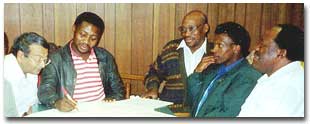|
New Team or Existing Team?
A newly selected team is definitely preferable to trying to change the habits and practices of an existing government department. However, many people come from within and not outside of existing government structures.. Most of the best staff arrived directly from school, college or from another department which had a teamwork philosophy, necessary for effective projects.
Level and Type of Skills
Technical knowledge required is not very high. Essential is a confident manner and ability to express oneself politely and clearly when dealing with builders, local officials, suppliers, and clients.
Important Traits When Interviewing
Consider type of personality that is needed to do job well rather than focus on particular academic or technical qualifications. Students straight from college often can be trained quite easily and were open to the “teamwork” spirit necessary. With a general technical background, the particular technical requirements of a project can be quickly taught.
Men or Women?
Many of the best staff have proved to be women. Women staff seem to get fewer complaints and more compliments about the work they do. Many of clients to come into the office for assistance are women and thus women are better for working with them. Women technical and community officers have the advantage of being able to understand, empathize and work better with the female clients. Female community workers have proven to be the most appropriate conveyors of promotion and education messages.
Equipment and Staff
Labor-intensive methods are the norm in sustainable programs, avoiding costly maintenance and operating costs of equipment. When programs are taken over by government and external support is ended or limited, operating costs must be low enough to fit into government budgetary constraints. Any equipment brings with it service, maintenance and repair costs, which are often higher than expected and can substantially affect monthly running costs. On-site sanitation is labor intensive, hence it is important to use labor-intensive methods in many cases except for limited jobs where modern technology is appropriate. Any equipment must be maintained and serviced locally, thus the very cheapest item may not always be the best if it would mean more maintenance problems.
Permanent vs Temporary Positions
The all too common ‘civil service lethargy’ is avoided largely because most staff are unable to be employed in established and permanent positions. Unfortunately, this also has the adverse affect that good staff have left for more permanent employment in other places.
Team Structure
The project team must be easily approachable, with a structure that enables people to get help required with a minimum of forms and waiting time. Working with people in a slow, highly bureaucratic way will not achieve the aims of working at the community level. Teamwork is the key to success. Everyone is expected to do his or her own job but is expected to be able to assist others when necessary. A balance of technical and community staff is required. A seniority structure must exist, but all staff are encouraged to communicate regularly and freely with each other. Junior staff and their opinions, attitudes, problems, needs and training were considered quite important to success. Senior staff must be prepared to also go out into the field, get dirty and tired and not expect others to do what they are not prepared to do for or by themselves. Monthly staff meetings are held to air views, problems and complaints, and to discuss new ideas.
Way of working
The project started with a set of ideas that were tested in a pilot phase. These ideas were continually tried, tested and evaluated, and refined when necessary. Successes, failures, ideas, and proposals were collected from other projects and from anyone who had a suggestion. At staff meetings, such ideas were discussed to reach a consensus on whether and how a particular idea should be tried. A ‘right way’ to proceed should not be expected from year one. Progress will require changes. There must be a willingness to admit when something has not worked and the willingness to try something else.
|

